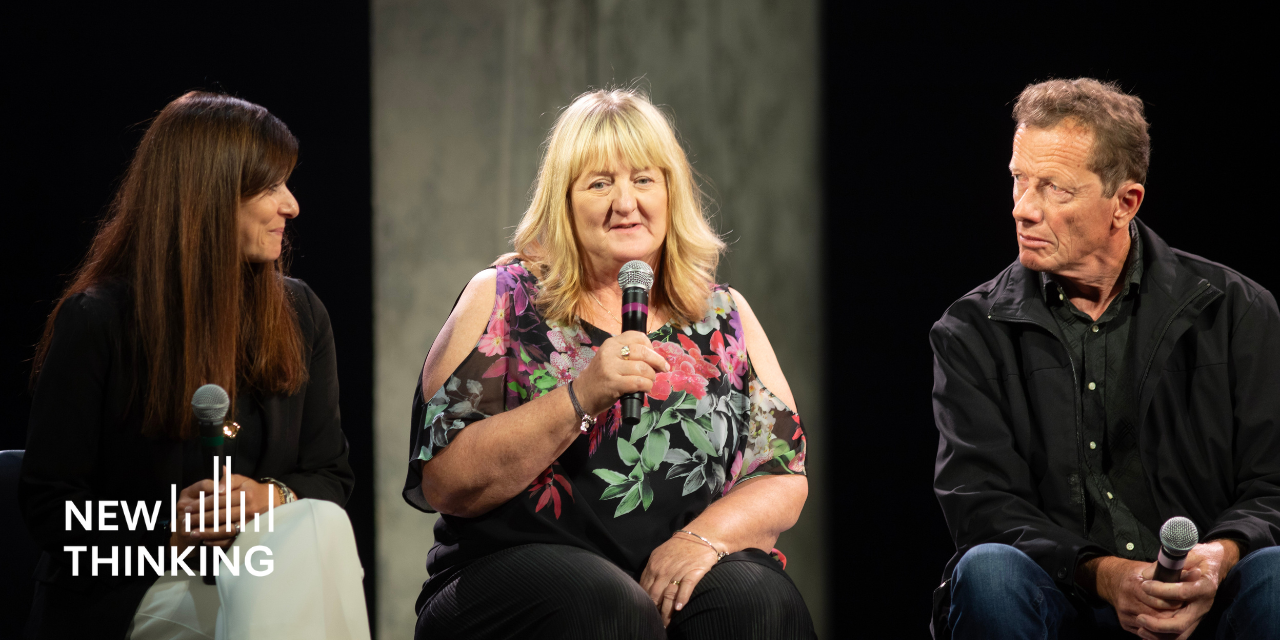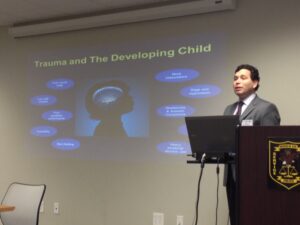Punch: The Real-Life Restorative Justice Story Behind the Broadway Show


At the kick-off summit for the Minority Youth Violence Prevention initiative, Dr. Joel Fein, a pediatrician and emergency medicine physician at The Children’s Hospital of Philadelphia, discusses youth relationships with authority, family dynamics, and how trauma and stress affect the developing brain. (February 2015)
The following is a transcript of the recording:
Dr. Joel FEIN:
So here’s the story. This is a story of a boy who I saw in the emergency department, but I saw him with this history. He had been running out of the store and he just saw policemen. He was just running out of the store, he was energetic. He wrote me and I think he told everyone else he didn’t do anything that made it… He just basically came out of the store quickly, saw the policemen, made eye contact, and then he just ran. He doesn’t know why he ran.
The police obviously thought they needed to figure out why he was running and chased him and they cuffed him pretty tightly. That’s was what brought him to my attention in the emergency department. He was 15 years old. Usually, the next door hospital, Hospital of the University of Pennsylvania, sees kids that are older than that, 18, 19-year-old kids. This was a 15-year-old and we saw him for a forearm injury. This was what I learned, his back story was that his father was killed by police when he was six and he just didn’t know why he ran, but I had a better idea, I think, than he did at that point. What was going through his head when he looked at the policemen who looked at him, possibly with a look that he’d received as, “You better run.”
Sarah SCHWEIG:
That was Dr. Joel Fein, professor of pediatrics and emergency medicine at the Perelman School of Medicine at the University of Pennsylvania.
Hi, I’m Sarah Schweig from The Center for Court Innovation and we’re at the Minority Youth Violence Prevention Initiative kickoff summit in DeKalb County, Georgia. The Minority Youth Violence Prevention Initiative is a joint effort by the Office of Minority Health of the U.S Department of Health and Human Services and the Office of Community Oriented Policing, or the COPS Office at the U.S Department of Justice. This is the first meeting of the nine grantee sites of the Minority Youth Violence Prevention Initiative. Participants are hearing from experts from both medical fields and policing fields about ways public health and police can work together to prevent violence. Let’s hear the rest of this particular story before turning to the conversation I had with Dr. Fein directly following his presentation.
FEIN:
I’m going to talk to you about what I call “knowing” which is very different from screening. I just wanted to know his story, and take the time to get to know him… His mom and grandma who were not there with him yet, both had chronic illnesses and grandmother’s worse than the mom. They seem to have a pretty strict household and strict can be good, or strict can be bad, depending on how strict. The differences between authoritarian and authoritative parenting is where pediatricians put their line in the sand.
He has two younger siblings, one is a challenged child with autism. He was said he was doing okay in ninth grade, which is the appropriate grade for his age, he never had that backpack point on, but he felt like his school was unsafe and that he didn’t enjoy being there. He had a few friends that he called friends, but he didn’t have anyone that you could tell anything about his life to. So this is the kid that was in front of us, and this is not unlike a lot of kids, where the environment is really tough and they are doing the best they can to negotiate it.
SCHWEIG:
I’m here with Dr. Joel Fein and he just gave a great presentation on the effects of trauma on the developing brain. So maybe first you could just talk about why doctors and hospitals are getting interested in preventing violence. What are some of the things that sort of spurred that on?
FEIN:
Sure. Well, I think that doctors and hospitals, our business is to both make people healthier and prevent illness from occurring. I think that the concept of wellness includes both mental health and physical health. Interestingly, what we now know about violence and the trauma that it causes in people’s lives is that it affects both emotional and behavioral health and physical health. It’s become very squarely in our wheelhouse to think about how we can devise ways as a hospital system, as a medical system to try and prevent and treat the impact of violence in our patients’ lives.
SCHWEIG:
One thing that you discussed was a study of people in their fifties and sixties, of the outcomes of earlier trauma or stress. Could you talk a little bit about what that was and kind of how you’re incorporating research into your efforts now.
FEIN:
You were referring to the ACEs studies, which have been fairly well known to associate adverse childhood experiences, which is what ACEs means, to long-term health outcomes. We’re learning much more now about the mechanisms by which that may be occurring. As a pediatrician, I’m very interested in how children develop and their brains develop. We are starting to realize that there’s a great impact of these early childhood experiences on the way someone behaves, acts and feels, probably because of changes in the hormonal systems and the brain structure, and even the genetics of what’s going on in their bodies and their families is happening.
SCHWEIG:
You mentioned the relationship between the body makeup and a genetic predisposition to stress and its relation to the environment. Can you talk a little bit about that?
FEIN:
It’s really not a genetic predisposition to stress as much as potentially different ways that the body expresses the genetics, based on the environmental exposures that someone’s had both prenatally and afterwards. So for example, you can have two exact same people with the same genes and a different environmental situation. And those genes would be what we call, coded differently, to create different proteins that may create a different phenotype or expression of those genes.
SCHWEIG:
What would you advise when dealing with these populations to keep in mind?
FEIN:
I think the take-home message is that knowing about the impact of these experiences on how people act and react, really helps us understand better how we can first and foremost, not re-trigger and not have them re-experience trauma because we are in positions as physicians, policemen, even social services of power. So we don’t want to re-trigger them. Then taking it a step further, I’m creating a system by which there’s less threat and less stress so that we can interact with the human being that they want to be and we want them to be.
SCHWEIG:
Wonderful. Thank you so much for speaking with me today. I’m Sarah Schweig of The Center for Court Innovation and I’ve been speaking with Dr. Joel Fein. We’re at the Minority Youth Violence Prevention Summit for the Office of Minority Health and the COPS Office. To learn more about The Center for Court Innovation or this initiative, visit www.courtinnovation.org. Thanks for listening